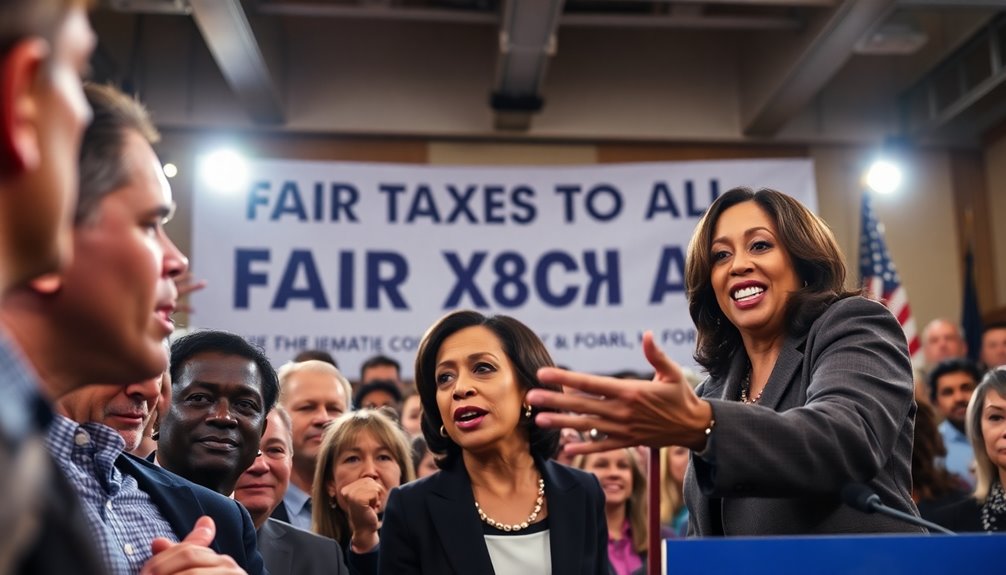Yes, Kamala Harris does want to raise taxes, especially on high-income earners and big corporations. She believes that higher taxes for those earning over $400,000 and corporations will help fund vital social programs and tackle income inequality. Her proposals include increasing the top marginal income tax rate and corporate tax rates. She also targets offshore profits and executive compensation deductions. While she aims to reduce the tax burden for low- and middle-income families, the wealthy will see higher rates. If you're curious about other aspects of her tax policies, there's more to discover.
Key Takeaways
- Kamala Harris supports increasing taxes on high-income earners and corporations to promote economic equity and reduce the deficit.
- Proposed tax changes include raising the top marginal income tax rate to 39.6% for those earning over $400,000.
- She advocates for a minimum income tax of 25% on individuals with wealth exceeding $100 million.
- Harris endorses expanding tax credits for low- to middle-income families to alleviate their financial burdens.
- Overall, her tax proposals reflect a progressive approach aimed at addressing wealth inequality.
Overview of Kamala's Tax Proposals

Kamala Harris's tax proposals aim to reshape the financial landscape for corporations and wealthy individuals alike. She plans to increase the federal corporate tax rate from 21% to 28% while raising the corporate minimum tax rate from 15% to 21%.
By tightening limits on deductions for executive compensation exceeding $1 million, she wants to ensure that large corporations contribute their fair share. Additionally, offshore profits of U.S. corporations would be taxed at a minimum rate of 21%, preventing corporate inversions.
In terms of capital gains, Harris proposes raising the long-term capital gains tax rate from 20% to 28% for those with taxable incomes over $1 million, along with a 5% net investment income surtax. This would effectively raise the rate to 33%. Furthermore, her proposals include increasing taxes on high-income individuals to help fund benefits for lower-income families.
She also aims to tax unrealized gains exceeding $5 million on inherited assets, reducing special breaks for investment income.
Moreover, Harris intends to quadruple the excise tax on stock buybacks and eliminate various tax loopholes that favor the wealthy.
Tax Increases on High-Income Earners

The tax increases on high-income earners are a central part of Kamala Harris's broader tax reform strategy. If you earn over $400,000, you'll see the top marginal income tax rate jump to 39.6%. Additionally, the net investment income surtax has increased from 3.8% to 5% for these taxpayers.
For those with incomes exceeding $1 million, long-term capital gains will now be taxed at 28%, potentially even higher if the surtax applies. Harris's plan also includes a minimum income tax of 25% for individuals with at least $100 million in wealth, targeting the wealthiest among us. On average, the richest 1% could face a tax increase of about 4.1% of their income. Harris's proposal for a minimum tax on unrealized capital gains for taxpayers with net wealth over $100 million aims to address wealth inequality.
Importantly, households making less than $400,000 won't see tax hikes; instead, they may benefit from expansions like higher earned income tax credits or child tax credits. While these changes aim to fund social programs and reduce deficits, they require Congressional approval. The debate surrounding these proposals highlights a significant contrast with other candidates' plans, especially those favoring tax cuts for high earners.
Corporate Tax Changes

Harris's proposed corporate tax changes aim to significantly increase revenue while ensuring that large corporations contribute their fair share. One of the key proposals is raising the corporate income tax rate from 21% to 28%. This increase is projected to reduce the deficit by $1 trillion over a decade, a figure supported by independent estimators like the Tax Foundation and the Penn Wharton Budget Model. Additionally, she plans to raise the corporate minimum tax from 15% to 21%, targeting very large corporations to ensure they pay a minimum tax rate. This aligns with her broader corporate tax reforms, building upon the Inflation Reduction Act.
Furthermore, this proposal is expected to generate significant revenue from the corporate sector over the coming years. Harris also seeks to strengthen limits on deductions for executive compensation exceeding $1 million and tax offshore profits at a minimum rate of 21%. These reforms aim to close loopholes that allow tax avoidance through offshore profits.
Finally, she proposes increasing the excise tax on stock buybacks from 1% to 4%, discouraging stock buybacks and promoting investment. Overall, these corporate tax changes reflect a commitment to creating a fairer tax system that holds major corporations accountable.
Specific Transaction Tax Increases

Specific transaction tax increases are set to reshape the financial landscape for high earners and investors. If you earn over $1 million, be prepared for a long-term capital gains tax rate increase to 28%, coupled with a 5% net investment income tax, bringing your total rate to 33%.
If you're passing on assets exceeding $5 million, you'll face taxes on unrealized gains, impacting your heirs significantly. This change aligns with the Harris tax plan, which aims to raise taxes on incomes over $400,000 to fund reforms.
For estate planning, the exemption drops from $13.61 million to $3.5 million per individual, with rates climbing as high as 65%. This change means you'll need to rethink your strategies if you have a sizable estate.
Real estate investors and farmers will also feel the pinch. The limit for 1031 Like-Kind Exchanges is set at $500,000 in gains, and you'll lose the tax deferral on excess gains.
Additionally, a minimum income tax of 25% will apply to individuals with wealth of at least $100 million, while the excise tax on stock buybacks will quadruple.
These specific transaction tax increases are designed to target high-income groups, making financial planning more urgent than ever.
Modifications to Existing Tax Laws

Modifications to existing tax laws aim to create a more equitable financial system, especially for high-income earners.
You'll notice that income tax rates and brackets will shift, restoring the top marginal rate to 39.6 percent for single filers earning over $400,000 and married joint filers over $450,000. If your income exceeds $400,000, expect benefits from the 2017 tax law to phase out, while the increased standard deduction and Child Tax Credit remain.
In terms of Medicare and health-related taxes, loopholes will close, ensuring those with higher incomes pay the additional Medicare tax and a new income-based premium for households earning over $100,000. Under the Harris proposal, the top 1% will face an average tax increase of 4.1% of income.
The top marginal rate for this tax will rise from 3.8 percent to 5 percent for incomes exceeding $400,000.
Additionally, capital gains and dividends taxation will change, raising the top rate from 20 percent to 28 percent for incomes above $1 million.
A new minimum tax of 25 percent will apply to extremely wealthy taxpayers, including unrealized gains.
Corporate tax reforms will also emerge, potentially increasing the corporate tax rate and addressing loopholes that contribute to income inequality.
Benefits and Credits for Taxpayers

As the tax landscape evolves, taxpayers can look forward to a range of benefits and credits designed to ease financial burdens and promote economic growth.
For families, the expansion of the Child Tax Credit (CTC) offers more support, including a $6,000 credit for parents of newborns. You'll also see higher Earned Income Tax Credit (EITC) eligibility for childless workers, making it easier to make ends meet.
If you're a first-time homebuyer, there's a $25,000 tax credit to help you secure your new home, along with down payment assistance.
For those starting a business, the deduction for startup expenses jumps from $5,000 to $50,000, encouraging entrepreneurship. Additionally, the proposed changes aim to lower taxes for low-income families, making it easier for them to thrive.
Moreover, the support extends to workers in industries like hospitality, with tax exemptions for tips and tax-free overtime pay.
The EITC expansion further lightens the tax load for low- and middle-income households.
Lastly, caregivers will benefit from a new tax credit, recognizing their vital role in supporting families.
With these initiatives, the aim is to enhance financial stability and foster growth across various sectors.
Impact on Various Income Groups

The recent tax changes are set to impact various income groups differently, aiming to provide relief where it's most needed. For low-income households, you can expect an average tax cut of about 7% of your income, translating to an average savings of $1,130. If you make around $33,000 or less, your after-tax income could rise by 3.6%. Notably, over three-quarters of low-income families with children will benefit, averaging a tax cut of $2,800.
If you're in the middle-income bracket, you'll likely see an average tax cut of 2.7%, roughly $1,980. More than 70% of households earning around $113,000 or less will benefit from at least one tax break, with an average decrease in taxes of $750. This is largely due to the expansion of the Child Tax Credit, which is projected to significantly help families.
Conversely, high-income households will face significant tax increases. The top 1% could see an average hike of 4.1% of their income, amounting to $121,460. Those earning over $14 million annually may pay about $167,000 more in taxes. These shifts reflect a targeted approach to tax policy, aiming to balance the scales across income levels.
Public Response to Tax Policies

Public response to tax policies reveals a strong sentiment among Americans regarding fairness in the tax system. Many believe the current tax structure favors the wealthy and large corporations over the middle class.
In fact, 58% of you support raising tax rates on household income over $250,000, a view shared by 71% of Democrats and 44% of Republicans. This highlights a rare bipartisan concern that the wealthiest individuals aren't paying their fair share. Furthermore, this concern is indicative of a broader societal desire for emotional alignment with policies that reflect collective values. Understanding production quantity variance is essential for evaluating the overall economic impact of tax policies. Additionally, many advocate for diversifying investments to create a more balanced economy that benefits all citizens. Moreover, a progressive tax system can help ensure that estate planning is equitable for all individuals.
Concerns about tax policies extend beyond fairness. You worry that tax laws primarily benefit the rich, potentially leading to cuts in essential programs like Medicare and education. Additionally, any changes in tax-exempt interest treatment could harm state and local financing, exacerbating the impact on public services.
While you might favor cutting spending in theory, there's a significant apprehension about losing public services you rely on.
Interestingly, about two-thirds of you favor raising taxes on large businesses and corporations, with 84% of Democrats strongly supporting these increases.
This public consensus suggests that advocating for higher taxes on the wealthy couldn't only address concerns about fairness but also potentially sway electoral support toward candidates who prioritize this issue.
The ongoing debates around tax laws will likely shape future political landscapes as your voices demand change.
Frequently Asked Questions
How Will These Tax Changes Affect Small Businesses?
The proposed tax changes could significantly impact your small business.
If tax rates rise and deductions diminish, you'll face higher operating costs, making it tougher to compete with larger corporations. Increased audits and regulatory burdens may add to your compliance costs, while limited deductions could hinder your growth and hiring potential.
Will There Be Any Tax Relief for Retirees?
You might be wondering if there'll be any tax relief for retirees.
While specific relief isn't heavily targeted at retirees, some proposals aim to exempt Social Security benefits from income tax and close loopholes in Medicare taxes.
Additionally, general provisions like the increased standard deduction and exemptions can benefit many.
It's essential to stay informed about changes that could indirectly affect your financial situation as a retiree.
Are There Plans for Tax Incentives for Renewable Energy?
Yes, there are plans for tax incentives for renewable energy.
You'll see tax credits for solar energy projects, which can save low-income households significant amounts each year.
There are also incentives for energy-saving home improvements, like insulation and heat pumps, leading to lower utility bills.
Plus, investments in community solar projects aim to power over 140,000 homes, creating jobs and reducing energy costs for everyone involved in this transition.
How Will These Taxes Impact the Economy Overall?
The proposed tax changes can significantly influence the economy. By increasing taxes on high-income individuals and corporations, it could generate substantial revenue, potentially funding vital programs.
You might see benefits like expanded tax credits for low- and middle-income households, stimulating consumer spending. However, higher corporate taxes might discourage investment, possibly slowing economic growth.
Balancing these effects is crucial, as the overall impact on the economy remains uncertain and could vary widely across different sectors.
What Are the Enforcement Measures for These Tax Changes?
The enforcement measures for these tax changes focus on ensuring compliance and increasing revenue.
You'll see heightened scrutiny on high earners and corporations, with new tax rates and closing loopholes.
For instance, the top marginal tax rate might rise, and capital gains taxes could increase significantly for affluent households.
Additionally, corporations may face higher rates and penalties on stock buybacks, all aimed at generating substantial revenue while ensuring fairness in the tax system.
Conclusion
In conclusion, Kamala Harris's tax proposals aim to increase taxes on high-income earners and corporations, while also modifying existing laws to benefit lower-income taxpayers. If you're part of a higher income bracket, you might feel the impact of these changes more than others. Overall, her approach seeks to create a fairer tax system that provides support to those in need. Public response is mixed, reflecting the ongoing debate about the implications of such policies.









